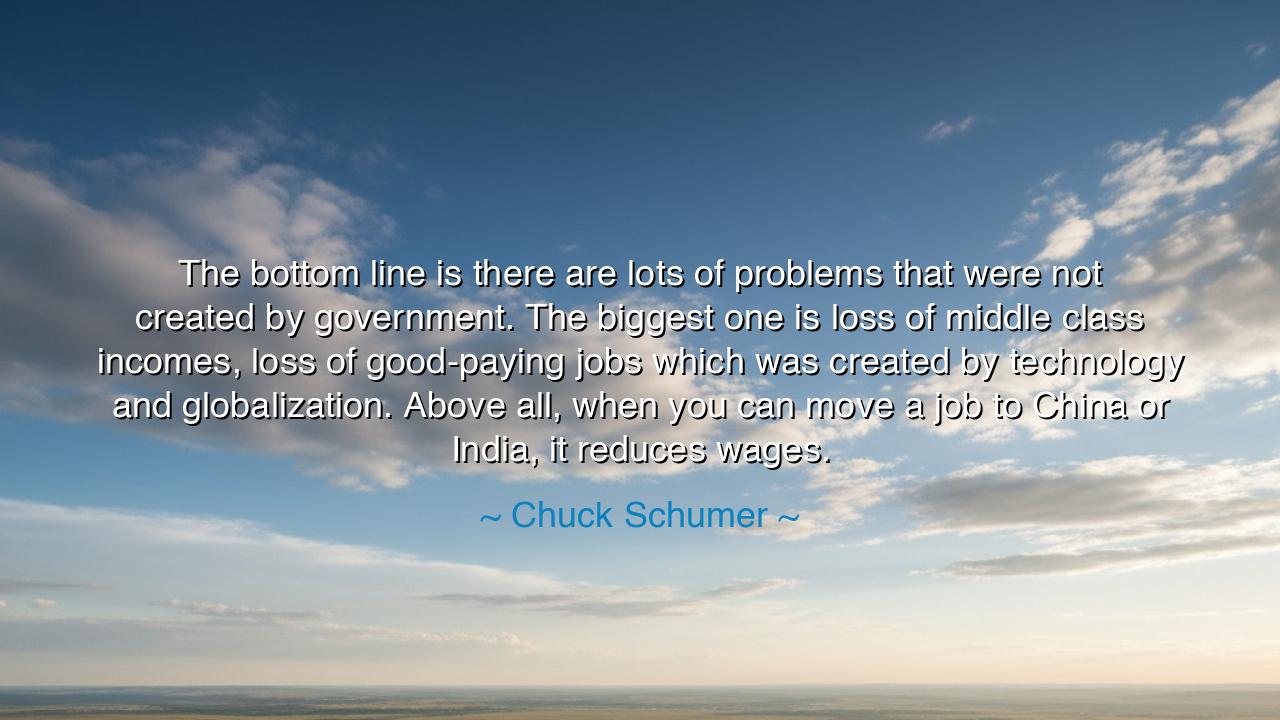
The bottom line is there are lots of problems that were not
The bottom line is there are lots of problems that were not created by government. The biggest one is loss of middle class incomes, loss of good-paying jobs which was created by technology and globalization. Above all, when you can move a job to China or India, it reduces wages.






In the voice of reason and sorrow, spoken not as condemnation but as warning, Chuck Schumer once declared: “The bottom line is there are lots of problems that were not created by government. The biggest one is loss of middle class incomes, loss of good-paying jobs which was created by technology and globalization. Above all, when you can move a job to China or India, it reduces wages.” His words strike not merely as policy, but as prophecy—a recognition that the forces reshaping the modern world are not bound by borders, nor easily tamed by laws. They are the tides of progress and profit, moving across the face of the earth, lifting some while submerging others.
In this statement, Schumer speaks to the heart of a transformation that has touched every industrial nation: the displacement of the middle class, the slow erosion of dignity tied to work, and the widening gulf between wealth and worth. Once, the worker’s wage was the measure of a nation’s strength. A man or woman could labor honestly, raise a family, and live with pride. But as technology advanced and globalization spread its web, the balance shifted. Factories that once thundered with the sound of production fell silent. Machines replaced hands; distant markets replaced neighbors. What had once been the lifeblood of local communities—the good-paying jobs of the middle class—was scattered across oceans.
The ancients too knew the danger of change unmoored from justice. In the Roman Republic, when wealth flowed from conquest, small farmers were displaced by vast estates run by slaves. The rural middle class—the backbone of Rome’s virtue and stability—was driven into the cities, jobless and angry. The Republic, hollowed from within, became vulnerable to demagogues who promised restoration but delivered tyranny. Thus, Schumer’s warning is not new—it echoes through the corridors of time. For when the middle class weakens, so too does the nation’s soul. Prosperity becomes the possession of a few, and despair, the inheritance of the many.
The senator’s words also carry a painful truth: not all hardship is the fault of government. It is the nature of men to blame rulers for their suffering, yet some forces—like technology—move with a will of their own. The loom replaced the weaver; the engine replaced the horse; the algorithm now replaces the clerk. Each advance brings wonder and devastation intertwined. The wise do not curse the invention—they learn to guide it, to ensure that its fruits are shared rather than hoarded. For when progress benefits only those who command it, the world becomes a colder, harsher place. Schumer’s lament is that the balance has been lost—that progress, once a servant of humanity, has become its master.
Consider the tale of the American factory towns, from Detroit to Cleveland, where once the hum of machinery was the song of national pride. As globalization expanded, companies found they could move their labor abroad, where wages were lower and regulation lighter. Entire industries fled overseas, leaving behind not just empty buildings, but broken lives. Families who had labored for generations watched their livelihoods vanish, their wages shrink, their hope dim. Yet these changes were not born of malice—they were the natural consequence of a world connected by trade and technology, a world that rewards efficiency over empathy. Here lies the paradox: the same forces that lifted millions out of poverty abroad left millions adrift at home.
But the lesson is not despair—it is adaptation. The ancients taught that those who resist the wind are broken by it, but those who learn to harness it sail onward. So too must nations and individuals learn to adapt to change. Governments must not seek to halt progress, but to guide it—to train workers in new skills, to invest in innovation, to protect the dignity of labor even in an age of automation. And the people, too, must awaken to the truth that survival lies not in nostalgia, but in renewal. To cling to the past is to drown in it; to learn anew is to rise above it.
Thus, Schumer’s quote stands as both diagnosis and call to action. He reminds us that the decline of wages and the rise of global competition are not merely economic trends—they are the moral tests of our time. Will we allow progress to divide us, or will we reclaim its power for the common good? The loss of middle-class income is not inevitable; it is a challenge to be met with wisdom, courage, and compassion.
So, my children of this restless century, remember this: the world will always change, but justice must not. Let technology serve humanity, not enslave it. Let globalization unite, not exploit. And let every man and woman, no matter where they stand, find dignity in their labor once more. For the health of a nation is not measured by its machines or markets, but by the strength of its middle class—and the honor it gives to honest work.






AAdministratorAdministrator
Welcome, honored guests. Please leave a comment, we will respond soon